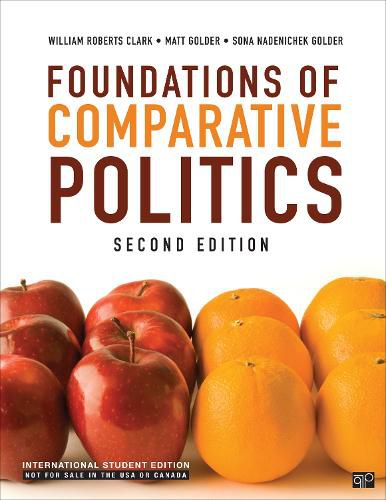Readings Newsletter
Become a Readings Member to make your shopping experience even easier.
Sign in or sign up for free!
You’re not far away from qualifying for FREE standard shipping within Australia
You’ve qualified for FREE standard shipping within Australia
The cart is loading…






Adapted from the groundbreaking bestseller Principles of Comparative Politics, Fourth Edition!
Foundations of Comparative Politics, Second Edition presents a scientific approach to the rich world of comparative inquiry, research, and scholarship, providing a guide to cross-national comparison and why it matters. This condensed, more accessible format introduces students to the key questions in comparative politics, using brief insights from tools such as decision, social choice, and game theory to help them understand clearly why some explanations for political phenomena are stronger than others.
William Roberts Clark, Matt Golder, and Sona Nadenichek Golder concentrate on describing the core features of regimes and institutions and on analyzing how these fundamental attributes drive variation in the economic and political outcomes we care about most. This approach-constructing and testing theories on political phenomena over basic memorization of country-specific facts-more closely replicates what comparative scholars do to explain, rather than describe. Current examples that show the application of theory help students develop invaluable real-world skills in critical thinking and empirical analysis that they will carry with them long after the course is over.
$9.00 standard shipping within Australia
FREE standard shipping within Australia for orders over $100.00
Express & International shipping calculated at checkout
Adapted from the groundbreaking bestseller Principles of Comparative Politics, Fourth Edition!
Foundations of Comparative Politics, Second Edition presents a scientific approach to the rich world of comparative inquiry, research, and scholarship, providing a guide to cross-national comparison and why it matters. This condensed, more accessible format introduces students to the key questions in comparative politics, using brief insights from tools such as decision, social choice, and game theory to help them understand clearly why some explanations for political phenomena are stronger than others.
William Roberts Clark, Matt Golder, and Sona Nadenichek Golder concentrate on describing the core features of regimes and institutions and on analyzing how these fundamental attributes drive variation in the economic and political outcomes we care about most. This approach-constructing and testing theories on political phenomena over basic memorization of country-specific facts-more closely replicates what comparative scholars do to explain, rather than describe. Current examples that show the application of theory help students develop invaluable real-world skills in critical thinking and empirical analysis that they will carry with them long after the course is over.